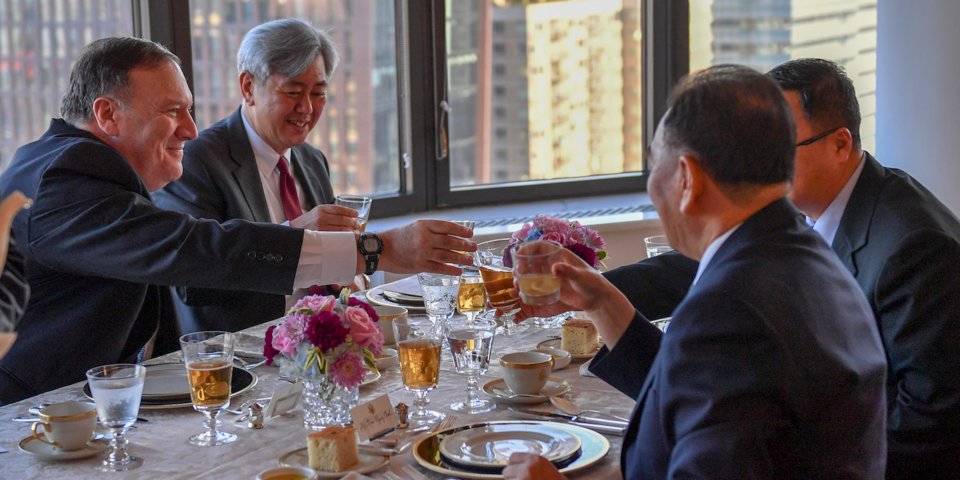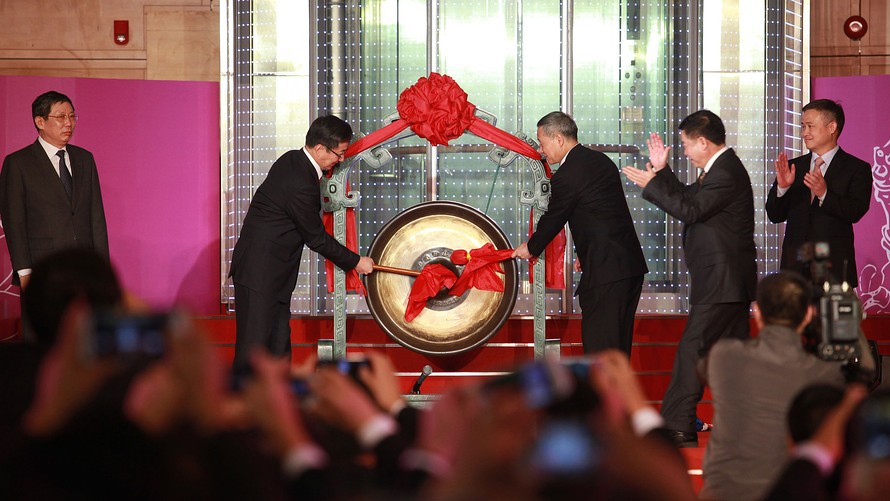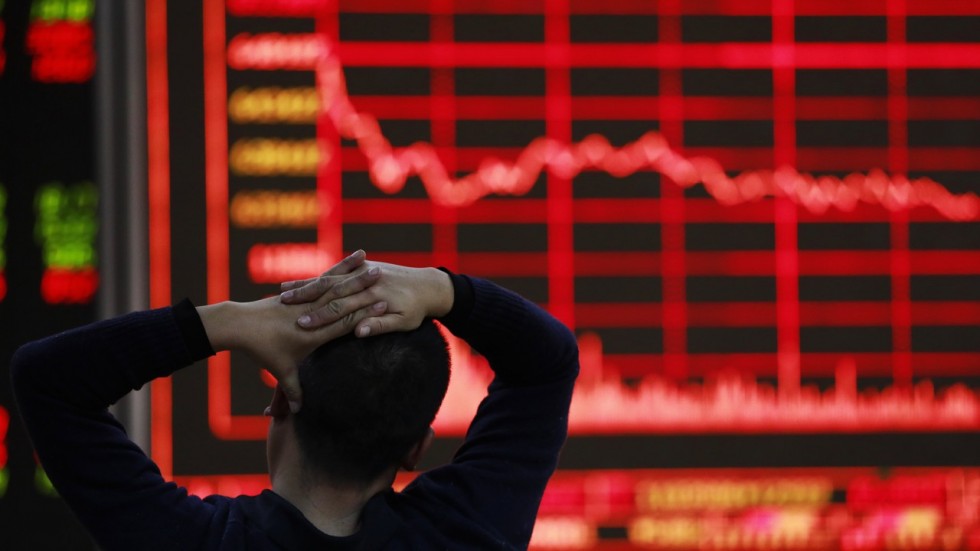
 USPACOM Rebranded As U.S. Indo-Pacific Command
USPACOM Rebranded As U.S. Indo-Pacific CommandThis week, the U.S. Pacific Command was given a new name: the U.S. Indo-Pacific Command, reinforcing Trump administration rhetoric on the importance of India to regional stability in Asia and suggesting a renewed U.S. focus on countering Chinese influence. The command, headquartered in Hawai'i, is responsible for all U.S. military activity in an area of responsibility that covers about half the earth's surface.
On Wednesday, that vast responsibility was passed from Admiral Harry Harris to Admiral Phil Davidson, freeing Harris to be President Trump's nominee for U.S. ambassador to South Korea. The change of control took place only a week after the U.S. disinvited China from the multinational Pacific Rim military exercise, which the U.S. defense department described as an "initial response to China's continued militarization of the South China Sea." They cited the movement of military equipment to the Spratly Islands and Woody Island in the Paracels. China also recently completed its first test landing of long-range bombers on an unspecified island in the South China Sea. China's involvement in the drill was seen as a confidence-building measure between the two militaries. China's defense ministry called the move "not conducive towards promoting mutual trust."
Announcing the renaming of the command on Wednesday, U.S. military officials gave mixed messages. Defense Secretary Jim Mattis argued that the name change was not meant to be combative, while outgoing command chief Harris said that the U.S. must remain involved in the region to counter "China's dream of hegemony in Asia." After a year in which U.S. allies have increasingly expressed their fears that the U.S. may be disengaging in the region, the new commander, Phil Davidson, highlighted the importance America places in relationships with Asian partners. "To our allies here in the Indo-Pacific, you will have no better ally," Davidson said. "Our friendship is rock solid. We must continue to work together. Peace and prosperity in the Indo Pacific relies directly on these bonds."
Zhao Weibin, profiling the new commander last month, wrote that we can expect "consistency in security and military policies" and views that "basically [do not] deviate from the Trump administration and the mainstream views of U.S. strategic and security circles."
 After a Week of Diplomacy, North Korea Summit is Back On
After a Week of Diplomacy, North Korea Summit is Back OnPresident Trump and North Korean leader Kim Jong-un will meet on June 12 in Singapore, Trump announced Friday afternoon after a week of diplomacy which saw visits by North Korean officials to the United States.
On Wednesday, Secretary of State Mike Pompeo shared a steak dinner with unlikely dinner-mate Kim Yong-chol, a former spy chief and North Korean border guard who has served three-generations of the Kim family. In a bid to save what we called the on/off Trump-Kim summit in an earlier edition of China This Week, the secretary talked denuclearization with officials from the Kim regime in Manhattan. In an echo of President Trump's tweet about chocolate cake after his meeting with President Xi Jinping at Mar-a-Lago last April, Pompeo tweeted Wednesday, "Good working dinner with Kim Yong Chol in New York tonight. Steak, corn, and cheese on the menu."
The most senior North Korean official to visit the U.S. in nearly 20 years, Kim Yong-chol needed a waiver of U.S. Treasury Department sanctions that bar him from entry to the United States to make the visit. On Friday, he broke another record by becoming the first top North Korean official to visit the White House in 18 years when he brought a letter from Kim Jong-un in person to President Trump. The contents of the letter have not yet been released, but The Wall Street Journal reports that it was "fairly basic" and "expresses the North Korean leader's interest in meeting without making any significant concessions or threats."
In a White House statement released Friday, President Trump said of the upcoming summit with North Korea: "I think we're going to have a relationship, and it will start on June 12th."
 Chinese A-Shares Make Their Debut
Chinese A-Shares Make Their DebutOn Friday, mainland investors likely watched with anticipation as over 200 Chinese A-shares made their debut on equity index compiler MSCI's emerging markets benchmark. These shares, which are yuan-denominated and cover companies listed in Shanghai and Shenzhen, included a mix of firms such as pharmaceuticals, liquor companies and electric car producers. The debut of mainland Chinese stocks, while small-scale compared to the larger index, is highly symbolic and an indicator of the easing of financial restrictions in China's economy.
As Bloomberg reports, "traders looking to track the gauges run by MSCI, the world's biggest stock index compiler, need to buy yuan-denominated stocks for the first time." This could result in an inflow of billions of dollars of foreign money into the mainland Chinese market— hence the excited investors. Reuters, which provides a useful explainer on the significance of the event, notes that some analysts estimate that about $20 billion will initially flow into Chinese stocks, with a potential for up to $300 billion.
This should pave the path for greater inclusion of shares from China's domestic market in exchange-traded funds. In the past, financial restrictions on moving money in and out of China's market meant that the MSCI could not include China— a process that has been mitigated lately with the usage of Stock Connect, a trading program that allows two-way trading between China and Hong Kong. Jon Howie, head of equity index strategy at BlackRock, told CNBC, "What it does is it starts a process that will include China A shares as a bigger and bigger component of this very important benchmark over time." Foreign investors looking to buy shares in Chinese companies can do so via the Shanghai and Shenzhen "stock connect" links with Hong Kong.
For more financial news, see Richard C. K. Burdekin and Ran Tao's piece in China-US Focus this week on the new Shanghai-London Stock Connect, which they call "a landmark step forward in China's integration with world financial markets."
 This Week's Top Commentary
This Week's Top CommentaryDinny McMahon, who spent 10 years reporting from Beijing and Shanghai as a financial journalist, ponders whether China's economic ascent is inevitable in an article for China-US Focus this week. "From 2005 to 2015—my years as a journalist—China's success was not a function of reform. It was the result of the willingness and ability of the government to paper over the cracks, and kick the can down the road. While there were attempts at top-down reform, they were routinely stonewalled, circumvented and selectively implemented at lower levels of the system."
"For me the idiom that best explains the dynamic at play between China's myriad levels of authority is: shangyou zhengce, xiayou duice, which loosely translates as, 'above there is policy, but below we have ways of implementing policy.' The expression sums up both the magic and the tragedy of the Chinese economy," he writes. You can read McMahon's analysis of what he calls President Xi's attempted revival of China's economic exceptionalism here.
Prepared by China-US Focus editorial teams in Hong Kong and New York, this weekly newsletter offers you snap shots of latest trends and developments emerging from China every week, while adding a dose of historical perspective.
- 2018-05-25 Trump Cancels North Korea Meeting
- 2018-05-18 The On/Off Trump-Kim Summit
- 2018-05-11 American Goods Are Stuck at Chinese Ports
- 2018-05-04 China and the U.S. Lay Trade Demands on the Table
- 2018-04-27 U.S. Delegation Will Visit China Next Week
- 2018-04-20 China and the U.S. Seek Allies in Trade Dispute
- 2018-04-13 President Xi Reviews the PLA Navy
- 2018-04-06 China and Russia Pledge Military Cooperation in a Signal to the United States
- 2018-03-30 Kim Jong Un Visits Beijing on First Overseas Visit
- 2018-03-23 President Trump Asks for Tariffs on Around $50 Billion Worth of Chinese Imports
- 2018-03-16 Tillerson to be Replaced by Mike Pompeo as Secretary of State
- 2018-03-09 President Trump Agrees to Meet Kim Jong-Un
- 2018-03-02 U.S. Imposes Tariffs on Chinese Aluminum
- 2018-02-23 A Week of Developments Related to North Korea
- 2018-02-16 Cui Tiankai says U.S. Should Not Advocate Confrontational Strategy Towards China
- 2018-02-09 China Releases the “No.1 Central Document” Containing New Rural Policies
- 2018-02-02 Wang Qishan Appointed to the National Legislature
- 2018-01-26 New Edition of the Focus Digest
- 2018-01-19 South Korea and North Korea to Compete Together at the Winter Olympics
- 2018-01-12 U.S. House of Representatives Passes Taiwan Bills
